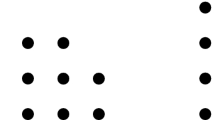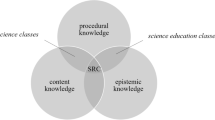Abstract
The subject matter competence in physics related topics of 147 inservice junior secondary science teachers in Hong Kong was identified using a true-or-false instrument based on a framework conceptualized by the authors. The findings of this study showed that teachers are weak both in factual knowledge and conceptions in these topics. Although physics majors outperform nonphysics majors significantly in the test, their own performance is by no means satisfactory on criterion referenced terms. Items incorrectly answered by over 40% of the teachers are listed with corrections given. The sources of conceptual mistakes and specific remedial measures were elaborated for items incorrectly answered by more than 60% of the teachers. General implications and possibilities for improvement in tertiary education, science teaching, and teacher education were discussed.
Similar content being viewed by others
REFERENCES
Ausubel, D. P. (1968). Educational Psychology: A Cognitive View, Holt, Rinehart and Winston, New York.
Ball, D. L., and McDiarmid, G. W. (1989). The subject-matter preparation of teachers. In Brophy, J. (Ed.), Advances in Research on Teaching (Vol. 2), JAI Press, Greenwich, pp. 437-449.
Bauman, R., and Adams, S. (1990). Misunderstanding of electric current. Physics Teacher 28: 334.
Beers, S. (1988). Epistemological assumptions and college teaching: Interactions in the college classroom. Journal of Research and Development in Education 21(4): 87-94.
Berliner, D. C. (1984). The half-full glass: A review of research on teaching. In Hosford, P. (Ed.), Using What We Know About Teaching. Association for Supervision and Curriculum Development, Alexandra, pp. 51-81.
Chan, W. K., Hui, Y. K., Wong, K. F., and Kong, S. W. (1993). Understanding Integrated Science 2A, Aristo, Hong Kong.
Claxton, G. L. (1993). Minitheories: a preliminary model for learning science. In Black, P. J., and Lucas, A. M. (Eds.) Children's Informal Ideas In Science, Routledge, London, pp. 45-61.
Curriculum Development Council (1992). Syllabus for A-level Physics: Forms 6 to 7, Government Printer, Hong Kong.
Curriculum Development Council (1993). Syllabus for CE-level Physics: Forms 4 to 5, Government Printer, Hong Kong.
Curriculum Development Council (1986). Syllabus for Science: Forms 1 to 3, Government Printer, Hong Kong.
Doyle, P., and Minns, R. (1991). New Integrated Science 2, Longman, Hong Kong.
Driver, R., and Easley, J. (1978). Pupils and paradigms: A review of the literature related to concept development in adolescent science students. Studies in Science Education 5: 61-84.
Driver, R., Squires, A., Rushworth, P., and Wood-Robinson, V. (1994). Making Sense of Secondary Science. Routledge, London.
Ebel, R. (1991). Essentials of Educational Measurement, Prentice-Hall, Englewood Cliffs, NJ.
Frazer, B. J. (1994). Research on classroom and school climate. In Gabel, D. L. (Ed.) Handbook of Research on Science Teaching and Learning, Macmillan, New York, pp. 493-541.
Fung, P. C. W., Fung, A. Y. C., and Chung, L. H. M. (1989). Integrated Science Today, Jing Kung, Hong Kong.
Gagne, R. (1977). The Conditions of Learning. Holt, Rinehart and Winston, New York.
Good, R. (1991). Editorial. Journal of Research in Science Teaching 28: 387.
Goodwin, A. J. (1995). Understanding secondary science: a perspective of the graduate scientist beginning teacher. School Science Review 76(276): 101-109.
Gunstone, R., and Watts, M. (1993) Force and motion. In Driver, R., Guesne, E., and Tiberghien, A. (Eds) Children's ideas in science, Open University Press, Milton Keynes, pp. 85-104.
Hashweh, M. (1988). Descriptive studies of students' conceptions in science. Journal of Research in Science Teaching 25: 121-134.
Helgeson, S. L. (1994). Research on problem solving: Middle school. In Gabel, D. L. (Ed.) Handbook of Research on Science Teaching and Learning, Macmillan, New York, pp. 248-268.
Johnson, K., Cheng, I., Mak, T. P., and Sun, S. C. (1995). Physics for Your Certificate, Pilot, Hong Kong.
Kagan, D. M. (1992). Professional Growth among preservice and beginning teachers. Review of Educational Research 62(2): 129-169.
Kuhn, T. (1962). The Structure of Scientific Revolutions, University of Chicago Press, Chicago, Illinois.
Lawrenz, F. (1986). Misconceptions of physical science concepts among elementary school teachers. School Science and Mathematics 86: 654-660.
Lawson, A. E. (1994). Research on the acquisition of science knowledge: Epistemological foundations of cognition. In Gabel, D. L. (Ed.) Handbook of Research on Science Teaching and Learning, Macmillan, New York, pp. 131-173.
Linder, C. G., and Erickson, G. (1989). A study of tertiary physics students' conceptualizations of sound. International Journal of Science Education 11: 491-501.
Lucas, A. M. (1995). Playing the notes but ignoring the tune: the narrowness of biology education research. Journal of Biological Education, 29(3): 195-200.
Mak, S. Y., and Young, K. (1988). Voltage measurements in a loop surrounding a solenoid: Some further paradoxes due to stray capacitances. American Journal of Physics, 56(3): 254-258.
Nelkon, M., and Parker, P. (1977). Advanced Level Physics, Heinemann, Hong Kong.
Pajares, M. F. (1992). Teachers' beliefs and educational research: Cleaning up a messy construct. Review of Educational Research 62(3): 307-332.
Sanders, M. (1993). Erroneous ideas about respiration: the teacher factor. Journal of Research in Science Teaching 30: 919-934.
Serway, R. A., and Faughn, J. S. (1989). College Physics, Saunders College, Philadelphia, Pennsylvania.
Shulman, L. (1986). Those who understand: Knowledge growth in teaching. Educational Researcher 15(2): 4-14.
Trumper, R. (1997). A survey of conceptions of energy of Israeli preservice high school biology teachers. International Journal of Science Education 19(1): 31-46.
Viega, M., Coster Pereira, D., R. (1989). Teachers' language and pupils' ideas in science lessons: Can teachers avoid reinforcing wrong ideas? International Journal of Science Education 11: 465-479.
Wandersee, J.H., Mintzes, J. J., and Novak, D.J. (1994). Research on alternative conceptions in science. In Gabel, D. L. (Ed.) Handbook of Research on Science Teaching and Learning, Macmillan, New York, pp. 177-210.
Wenner, G. (1995). Science knowledge and efficacy beliefs among preservice elementary teachers: A follow-up study. Journal of Science Education and Technology 4(4): 307-315.
Willson, M., and Williams, D. (1996). Trainee teachers' misunderstandings in chemistry: Diagnosis and evaluation using concept mapping. School Science Review 77(280): 107-113.
Yip, D. Y. (1996). Misconceptions of Biology Teachers and the Implication for Teacher Education Programs. Paper presented at the International Conference on Basic Education, Hong Kong.
Author information
Authors and Affiliations
Rights and permissions
About this article
Cite this article
Yip, D.Y., Chung, C.M. & Mak, S.Y. The Subject Matter Knowledge in Physics Related Topics of Hong Kong Junior Secondary Science Teachers. Journal of Science Education and Technology 7, 319–328 (1998). https://doi.org/10.1023/A:1021819225169
Issue Date:
DOI: https://doi.org/10.1023/A:1021819225169




